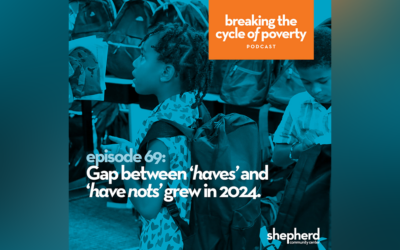Health-care expenses, according to the U.S. Census Bureau, pushed about 8 million Americans into poverty in 2018. And that was before the COVID-19 pandemic disrupted the economy and drove up health care spending by nearly 10%.
Good health is often taken for granted until it’s threatened in some way. But once a person’s health slips, the damage to employment, including lost wages, hits just as household expenses increase. As a result, a person can lose financial stability in only a few weeks and regaining that stability can take years.
At Shepherd Community Center, the staff has identified good health and mobility as one of 10 essential assets for breaking free of poverty and sustaining financial independence.
“I’ve talked to too many parents in the past couple of years who feel forced to neglect their own health so that they can meet their children’s needs,” Jay Height, executive director of Shepherd, said. “That will catch up with at least some of them, and then the outcomes aren’t good for anybody.”
In 2015, researchers with the Urban Institute and Virginia Commonwealth University found that lower-income adults were almost five times as likely to be in fair or poor health as those with incomes at 400% of the poverty level, which at the time was less than $24,000 for a family of four. Lower incomes also are associated with higher rates of diabetes, heart disease, stroke and other chronic illnesses.
To help improve and sustain neighbors’ health, Shepherd, with the support of partners such as Ezkenazi Health and the city of Indianapolis, offers a variety of services, including deployment of a fulltime paramedic who provides direct medical care and assists patients in obtaining treatment from other medical professionals.
Shepherd also has hosted drive-through clinics where neighbors can receive services such as free flu shots.
And part of the long-term strategy behind operating a food pantry, offering cooking classes, and filling students’ backpacks on Fridays with nutritious food to eat on weekends is to sustain adults’ and children’s health. Good, sustained nutrition is a preventative health measure.
“We know that health care can be expensive. And we know our neighbors are often at higher risk of various illnesses,” Height said. “We’re committed, as part of our mission to break the cycle of poverty, to ensuring that neighbors have access to the health services they need.”




